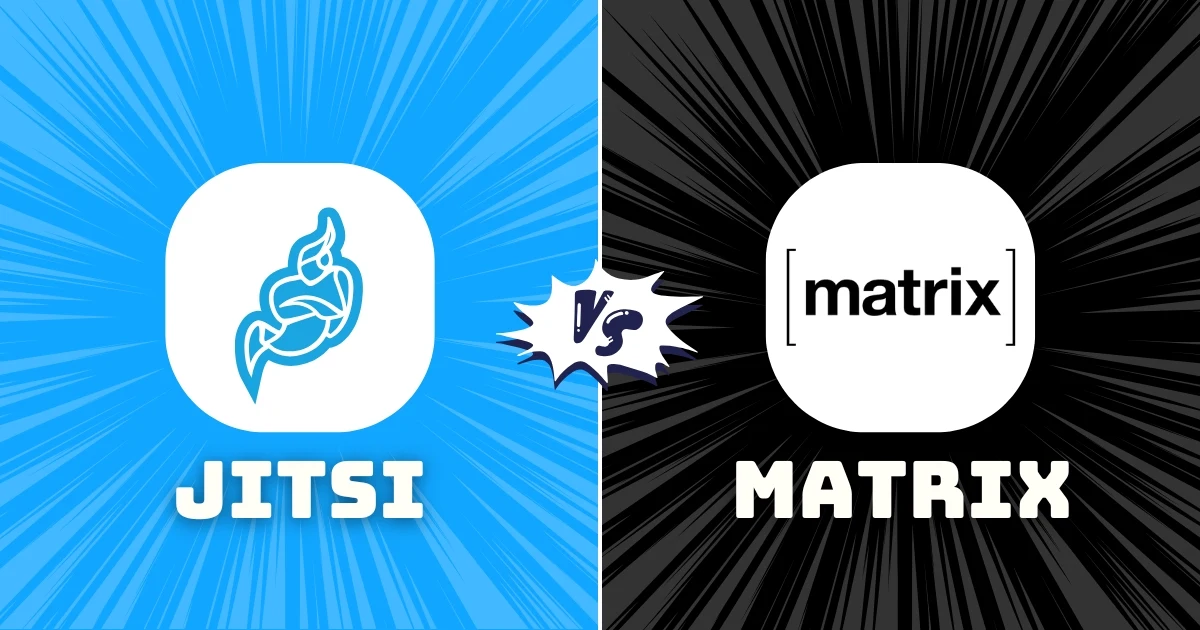More people and companies are looking for ways to talk and share online without giving up their privacy. Big tech tools like Zoom or Slack are popular, but they often collect data or charge high fees. That’s where Jitsi and Matrix come in. Both are free, open-source, and made to protect your communication.
I’ve worked with both tools while helping clients run private meetings and chats. Here, I’ll explain how they work, where each one is better, and how to pick the right tool for your needs — using simple, easy-to-understand language.
What Is Jitsi?
Jitsi Meet is an open-source video calling app. You can use it to have video meetings right in your browser — no sign-up, no software needed. You can also host your own Jitsi server if you want full control.
What You Can Do with Jitsi:
- Start video calls without an account
- Share your screen during a call
- Chat with others while on a call
- Record meetings (if you add Jibri)
- Host your own Jitsi server for privacy
If your main goal is to have simple and private video calls, Jitsi is a great pick. It works on web and mobile, and the setup is easy if you’re a developer or tech-savvy user.
What Is Matrix?
Matrix is a chat protocol. That means it’s not just one app — it’s a system that powers many apps, like Element. With Matrix, people can send messages, share files, make calls, and run chat rooms on their own servers.
What You Can Do with Matrix:
- Send private and group messages
- Make voice and video calls
- Use end-to-end encryption by default
- Set up your own server and keep full control
- Bridge messages to apps like Slack or Telegram
Matrix is best for ongoing team chat, privacy-first groups, or anyone who wants full control over their messaging.
Key Differences: Jitsi vs Matrix
| Feature | Jitsi | Matrix |
|---|---|---|
| Main Use | Video meetings | Messaging and collaboration |
| Self-Hosting | Easy | Medium to advanced |
| End-to-End Encryption | Only in certain cases | Yes, by default |
| Type of Tool | App for video calls | Protocol for messaging |
| Persistent Chat | No | Yes |
| Integration Support | Some (Jibri, Jigasi) | Many (Slack, IRC, Telegram) |
| Mobile Support | Yes | Yes (e.g., Element app) |
| Best For | Quick meetings | Ongoing secure conversations |
Privacy and Security
If you care about secure messaging, Matrix is stronger. It encrypts messages by default, and you can host your own server.
If you only need private video calls, a self-hosted Jitsi setup is good enough. Just note that Jitsi chat is not encrypted and doesn’t save your history.
Which Is Easier to Set Up?
- Jitsi is quick and simple. You can install it in less than an hour using Docker or the install script.
- Matrix (Synapse) takes more effort. You’ll need to manage things like certificates, bridges, and user settings.
If you’re new to self-hosting, start with Jitsi. If you’re comfortable with servers, Matrix is a strong long-term tool.
When to Use Both Together
Some people use Matrix for messaging and Jitsi for video calls. In fact, the Element app already lets users start Jitsi video calls inside the chat. This combo gives you full control over both chat and meetings.
Conclusion: Jitsi or Matrix
It depends on what you need:
- Use Jitsi if you want fast, private video calls with no setup headaches.
- Use Matrix if you want a long-term, secure, and private messaging platform.
- If you want both — use Matrix for messages and Jitsi for video.
Got questions or need help setting up Jitsi? Contact us — we provide expert Jitsi installation, scaling, and customization services.
